How it became almost mandatory for dads to attend the birth
- Published
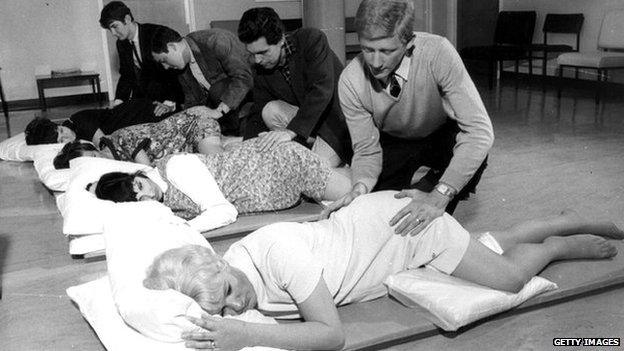
Prenatal classes in the late 1960s encouraged men to get more involved in the pregnancy
Times have changed and it is now rare that a man does not attend the birth of his baby, but how did it come to pass and could things ever change back?
In the 1950s, the father wasn't at the centre of the business of birth.
The Sunday Express Baby Book, published in 1950, set the scene for a hospital birth:
"In the delivery room, white with bright lights, you will be taken from a hospital trolley to the delivery table. The nurses will be standing by with the doctor and with their gentle help and encouragement, aided by the science they have studied so long, your baby will be born."
But where is the father?
Testimonies from the 1950s suggest many men thought it was not a man's place, says Dr Laura King, a research fellow at the University of Leeds. Her project - Hiding in the Pub to Cutting the Cord, external - gathered parents' experiences of childbirth from the 1950s onwards.
"There were quite a lot of men who couldn't quite cope with the idea. Equally a lot of women didn't like the idea of their husbands seeing them in that way," says King.
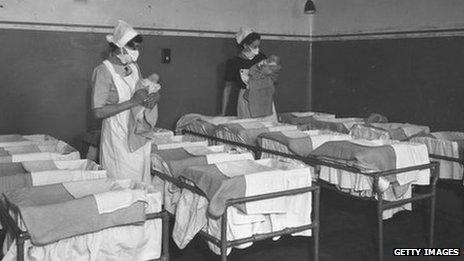
Maternity wards were very different 65 years ago
There may have been a social hangover from the Victorian era. "In the 1920s, 30s, 40s you find plenty of examples of couples who talked about not having ever seen each other naked, they've got six children, but they've never actually seen each other fully naked," says King.
In Victorian Britain, there were some exceptions to the rule. Prince Albert, for instance, was supposedly with Queen Victoria at the birth of some of their children and aristocratic fathers were more likely to be present at the delivery to greet the arrival of a male heir.
Although some fathers did prefer to remain in the pub in the 1950s, things were gradually starting to change. The arrival of the NHS in 1948 meant more women were having children in hospital rather than at home.
"You had some quite progressive hospitals such as University College Hospital in London that started to encourage men in 1951," says King.
The real change came in the 1970s.
"It is very hard to find definitive statistics on this, but from the late 1960s to the late 70s it goes from a minority to something between 70-80%," says King.
The Peel report of 1970 stated that every woman should have access to hospital care when giving birth and the number of home births began to radically decline.
Away from the familiar surroundings of the home, women looked to a birthing partner for more moral support and men started to play an increasing role.
In 1970s sitcom Some Mother's Do 'Ave 'Em, when Frank Spencer's daughter Jessica is born, external, the hapless father has to ask the doctor's permission to attend the birth.
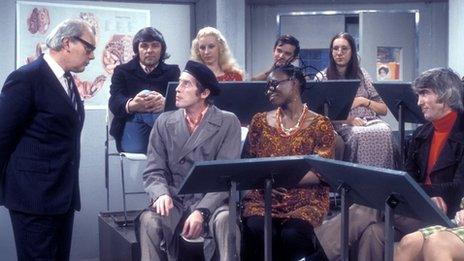
Frank Spencer prepares himself for fatherhood by attending a prenatal class
In the 1970s there were three different sets of feelings involved - the woman's, the man's and the medical profession's.
"There is a school of thought that said that doctors feel quite threatened by another presence in the room, another person who's asking questions about why they are doing what they're doing," says King.
There was also initial scepticism from some midwives, but attitudes started to change as the issue began to be discussed more widely in medical journals.
Changing concepts of privacy and marriage since WWII have also had a big impact for parents, says King. There is now more focus on the emotional bond between a man and a woman.
Peer pressure has grown.
We look back on midwifery in the 1950s with nostalgia today in dramas such as Call the Midwife. Community midwives in vintage costumes cycle through the East End of London with scissors and forceps in their bags, ready to deliver babies in the tough economic conditions of post-war Britain, the father often waiting outside.
Now people watch programmes such as One Born Every Minute. A father can join the mother in the hospital birthing pool, external, cut the cord and announce the sex of the baby.
People would be surprised if, for instance, Prince William chose not to attend the birth of his child in July. But could we see the tide shift again?
Celebrity chef Gordon Ramsay has spoken publicly about not attending the birth of his four children,, external claiming that he thought his sex life "would be damaged by images like something out of a sci-fi movie - skinned rabbits and conger eels coming at me from everywhere".
In 2009, a French obstetrician, Michel Odent, blamed fathers for an increasing rate of births by Caesarean section, external. He claimed that a male partner in the delivery room can make a woman more anxious, slowing the production of oxytocin, a hormone which helps the labour process.
But a study in 1962 by US doctor Robert Bradley suggests that the father's presence actually helps the woman relax.
About 14% of fathers today are still not able to attend the birth of their babies., external And there are many who have to steel themselves.
"The main part I have played in this pregnancy was getting her pregnant," says 19-year-old amateur footballer Callum Coker who decided to go on a five-week crash course for a BBC documentary to find out how to become a supportive birthing partner.
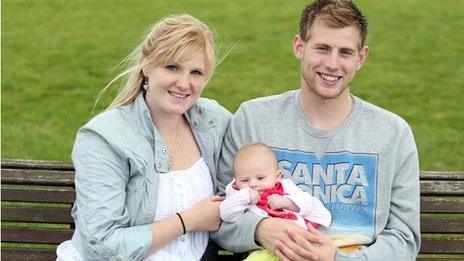
Callum Coker and his partner Laura Griffen are the proud parents of baby Layla
Coker is not alone in feeling isolated from the birthing process. One in three men in the UK have said they feel left out of pregnancy, external and sidelined at the birth.
"I think dads when they come into hospital with their wives in labour it can be a really scary place because they are not in control. We're trying to arm them with knowledge to help them have a good transition into fatherhood," says Fiona Laird, head of midwifery at North Middlesex hospital in London.
The more a man can read and discover what changes occur to the woman's body during pregnancy and labour, the more they are prepared.
Yet for some dads even if they combat the stress and panic, they are often fearful of the dreaded gore - dads like Coker who hate the sight of blood and worry about what will happen at the "business end".
Anything up to 500ml of blood at the birth is normal,, external but looking at videos of real life births can help desensitise squeamish fathers and allow them to conquer their worries.
Sharing and talking about your fears with other dads-to-be is also a therapeutic experience, says community midwife Mary Budd from Bristol, who has delivered over 1,000 babies.
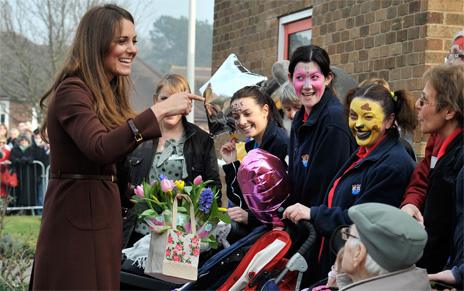
Will the royal father-to-be attend the birth?
A good place to meet fellow dads-to-be is at antenatal classes. In some parts of the UK, men can also attend dedicated Mantenatal and Daddynatal classes.
In the end, Coker was with his partner Laura Griffen at the birth and is now the proud father of a baby girl called Layla.
"I'm definitely over the fear of gore and blood without a doubt, it's natural. You just have to remember what it was for… now she's here it just makes it all seem worthwhile. I'm ready for our life to begin now."
You can follow the Magazine on Twitter, external and on Facebook, external